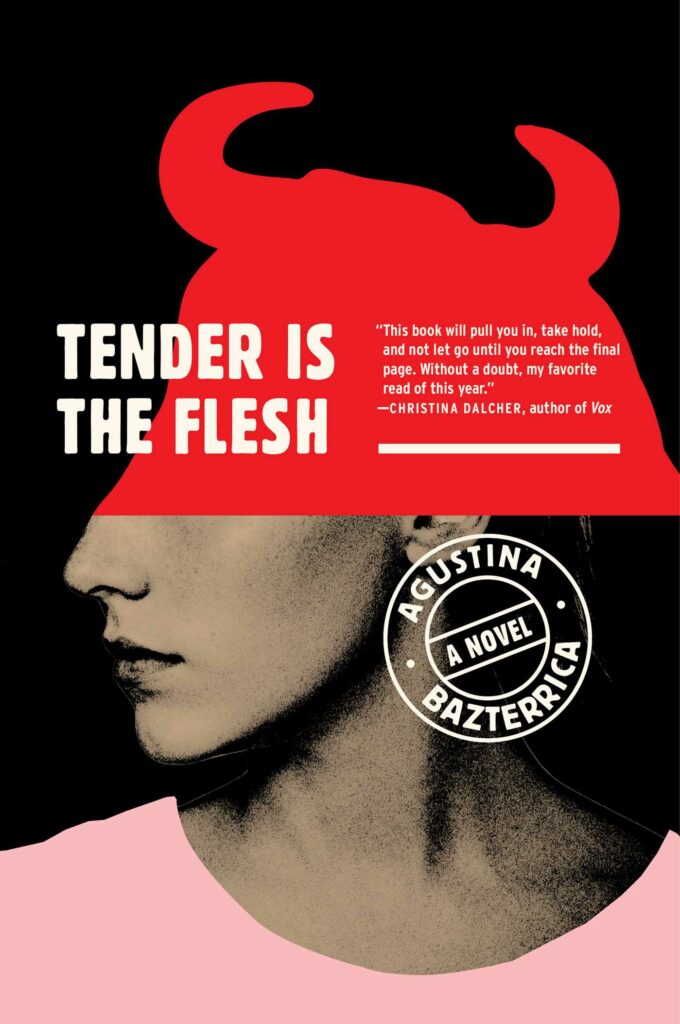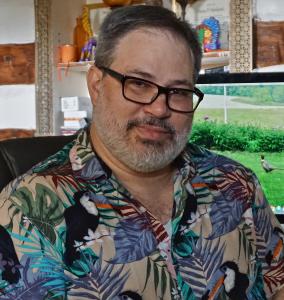Este mundo se tiene que acabar is something church ladies mutter to each other when something offends their moral sensibilities. This world has to end – but what if it didn’t? What if it kept grinding along, getting worse and worse, and everyone simply adapted to it? What would we do?
This is what Agustina Bazterrica’s stunning and brutal novel, Tender Is the Flesh (Cadaver Exquisito in its original Spanish) asks of us. Marcos Tejo remembers the world before a pandemic swept through the animal world and made them inedible to humanity. He remembers the poor and marginalized killed and eaten in secret. How quickly the government caved to big business interests and legalized cannibalism – not that anyone would call it that anymore. Marcos knows how easy it had been to repurpose his father’s old slaughterhouse and meat packing plant for the so-called ‘special meat’.

Special meat. Product. Heads. First Generation Pure. Males. Females. Words to hide the world, to make the horrors of surviving it palatable. Throughout this short novel, Bazterrica introduces mundane slaughterhouse words in new contexts by the post-Transition government. Each word abstracts, anesthetizes, hides the truth; each phrase offloading recognition of horror to the reader, making it their responsibility to recoil from the inhumanity lurking behind so many convenient words. Anyone foolish enough to deviate from the officially recognized terms, however, runs the risk of being turned into product themselves in their local slaughterhouse.
It’s the type of policy that discourages heroics.
Marcos is not a hero. He’s suffered too many losses for that kind of sentimentality. Forced to sell the family business to pay for his father’s dementia healthcare is the first of many blows. There’s also the humiliation that the sale isn’t enough for Marcos to retire early, so he returns to his father’s former meat-packing plant as a special consultant. Even the one bright spot in the recent past – Marcos and his father’s nurse falling in love and getting married – is dealt a stunning blow with the loss of their child. Cecilia retreats from their marriage, leaving Marcos to grieve alone.
Alienated from and deeply wounded by the world that has been created, Marcos is a cynical observer of its inner workings. An outsider. Someone who alone seems to bridge the divide between the world as we know it and the new one created by apocalyptic change. Marcos is complicated and utterly compelling, his thorny demeanor a defense against his own pain. He’s a common enough type of character in post-apocalyptic stories – the reluctant hero able to carve out a place for the old status quo to take root once again. Except Marcos isn’t a hero.
What Marcos is becomes clearer as the story progresses – he is as lonely as a humanity given full dominion of the earth can be. Cut off from the natural world so completely that humanity’s hope for survival and continued threat both have human faces. This gives Marcos’ cynicism a purity he uses as a shield.
His resolve is tested, however, when a young female head is gifted him by one of his clients. Her introduction into Marcos’ daily routines seems to reinvigorate him, giving him a purpose again. He bathes her, dresses her, and even names her Jasmine – in defiance of the government’s policies. His continued sheltering and care for Jasmine hint at a growing resistance within Marcos, a vein of heroism hidden until then, simply waiting for the right circumstances to be brought to the surface. An idea that would spread, inspire others to also take a stand against inhuman policies, against sanctioned murder, against human beings devouring other human beings – in another kind of novel.

Karlo Yeager Rodríguez
Karlo Yeager Rodríguez is originally from the enchanting island of Puerto Rico, but moved to the Baltimore area some years ago where he now lives with his wife and one odd dog. His fiction has appeared in Nature, Uncanny, Beneath Ceaseless Skies, and the Speculative Fiction for Dreamers anthology; his other writing can be found in Blood Knife. When not writing, Karlo hosts Podside Picnic, where he discusses the full spectrum of the literature of the fantastic, and has also narrated stories for Escape Pod, Pseudopod and Podcastle.
